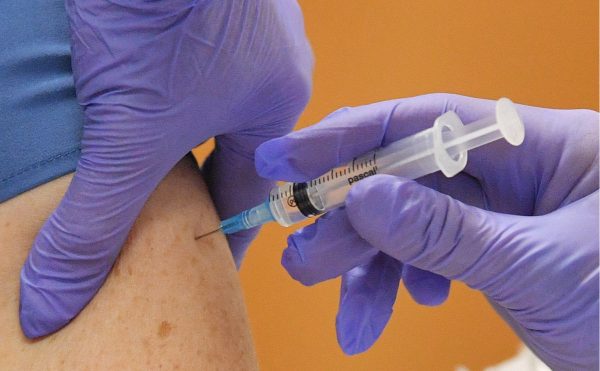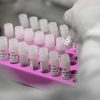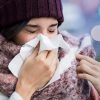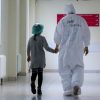 Can people with antibodies get infected with coronavirus again, do you need to get vaccinated after the disease and how long will the vaccine be effective? Irina Yakutenko, a molecular biologist, science journalist, author of the book about coronavirus “The virus that broke the planet”, explains it.
Can people with antibodies get infected with coronavirus again, do you need to get vaccinated after the disease and how long will the vaccine be effective? Irina Yakutenko, a molecular biologist, science journalist, author of the book about coronavirus “The virus that broke the planet”, explains it.
As the number of COVID-19 patients grows and the coronavirus itself does not seem to disappear and it sometimes also mutates quite profoundly, more and more people are wondering whether they need and can be vaccinated against SARS-CoV-2 despite being previously infected. However, not only local therapists, but even also leading experts in the field of immunology and virology cannot give a definite answer.
Because, firstly, we do not have enough data yet, and secondly, the situation is changing very quickly, and what was effective yesterday may not work the day after tomorrow. Nevertheless, there are some suggestions as to what we should do.
Why would people, who have previously contracted the infection, need a vaccination at all?
Many respiratory diseases give short-term immunity: that is, a person who has suffered a cold can again become infected with the same virus in a few months and they will sneeze, cough, and lie in with a fever again. There are four seasonal coronaviruses that cause colds in people, and we can get infected with them twice a year.
It is not completely clear what the reason is for such a fleeting immunity to cold. The main hypothesis is that these diseases are mainly based in upper airways, and it is the local immunity that deals with them. Uncomplicated diseases do not normally stimulate the systemic immune response, so although the body develops the most well-known IgGs, their number is small, and memory B cells that carry instructions for the synthesis of antibodies quickly disappear. The same applies to memory T cells, which must activate special killer cells when they encounter a pathogen again: for respiratory infections, only T cells that remain near the site of infection are activated, and they disappear in a few months without transferring their knowledge of pathogens to the system level.
Another possible reason for short-term immunity is the mild progression of the disease. It is related to the previous one: if a disease is mild, the immune system responds using local means and/or innate immunity, and the body does not preserve the memory of these battles in the form of instructions for creating specific immune weapons (antibodies and T cells).
COVID-19 is a respiratory infection that passes relatively easily and even asymptomatically in most people. This suggests that immunity to coronavirus may be short-term.
However, available actual data do not allow us to explicitly confirm or refute this assumption. In some studies, scientists see that the titer of antibodies, including neutralizing ones: that is, those that most effectively prevent infection of new cells, quickly drops over time. Other studies have shown that neutralizing antibodies persist after the disease for at least five months, and memory T cells persist for six months.
Nevertheless, it seems that the number of antibodies still decreases quite quickly, and the speed of their disappearance depends on the severity of the disease: the easier it was for a person to recover from coronavirus, the faster the memory of this event disappears from their body.
Are there records of repeat infections?
We have a number of reports about repeat infections. It is difficult to say exactly how many people have contracted coronavirus twice in less than a year, because it is possible to confirm the second infection only when scientists decipher the RNA sequences of both the virus that caused the first disease and the virus that caused the second infection. Such data are available only for five patients.
Most people were diagnosed with COVID-19 based on a PCR test and/or clinical picture. No samples of their biological fluids have been preserved since the first infection, so it will not be possible to decipher the genome of the first virus and compare it to the second one.
Moreover, the disease was asymptomatic for one of the five patients with confirmed reinfection: coronavirus RNA was detected due to mandatory testing at the airport. At the same time, the absolute majority of asymptomatic patients in the West, where testing has not been deployed to the Chinese scale, pass unnoticed by doctors.
All these facts indirectly indicate that there may be more “repeaters”. Most likely, the majority of them will experience the new encounter with coronavirus easily or without symptoms. But not all of them.
Of the five confirmed patients, a 46-year-old man from Ecuador was much more ill the second time than the first time, and an 89-year-old woman from Netherlands died. And if the elderly lady suffered from cancer that affected her immune system, the Ecuadorian had no known chronic diseases. These data indicate that if reinfection becomes a mass phenomenon, the number of COVID-19 victims may increase.
Vaccination won’t provide long-term protection as well, will it?
But if the immunity after the coronavirus infection is short-term, the vaccination does not also provide protection for long: this argument looks quite reasonable, and it is possible that it is the way it is. We will only be able to check exactly how long the immunity of vaccinated people lasts if we wait.
It is likely that the protection after vaccination will last longer than after encountering the real virus. Because coronavirus uses a lot of clever tricks, the purpose of which is to prevent the immune system from reacting properly.
At least nine SARS-CoV-2 genes encode proteins that somehow interfere with the immune response. For example, nsp15 destroys double-stranded RNA fragments that are characteristic for viruses (they inevitably appear when we read the information from the genomic RNA of coronavirus). The cell recognizes such fragments and activates the antiviral response.
The nsp10 and nsp16 proteins attach special labels to the SARS-CoV-2 RNA, which make them indistinguishable from cellular RNAs. If the RNA molecule does not have such a label, the cell recognizes it as viral and triggers protective reactions.
The protein synthesized from the ORF9b gene prevents the infected cell from synthesizing interferon, which stops protein synthesis both in the affected cell and in its neighbors. This measure kills the cell, but at the same time, it does not allow the virus to build its own components and collect new particles from them.
These and other tricks prevent the cell from realizing in time that it has the virus and from starting to fight it, including by calling specialized fighters of the immune system for help. Therefore, in case of a natural infection, protective reactions often begin later and do not develop according to the ideal scenario.
In case when we introduce the body to viral fragments by vaccination, it reacts to foreign elements at it should react, consistently deploying more serious lines of defense: first, innate immunity, then adaptive immunity: that is, the one that involves T and B cells. In case of a mild and natural progression of the disease, defensive measures may be limited to innate immunity, which means that the body will not develop specific protection if it encounters the virus again. In addition, the vaccine is injected in the muscle and not in the respiratory tract, which is a special zone from the point of view of immunity and it deals with its own pathogens by itself.
Yet, things can be more complicated regarding the last argument. Many experts believe that it is necessary to create protection in the respiratory tract to effectively prevent infection.
However, the situation with vaccines that could be sprayed into nose or throat to stimulate local immunity is bad: only one such flu vaccine has been registered so far, and the results of its use are not too impressive: traditional vaccines are often more effective. So, although the idea with local vaccines is promising, there have been very few real practical developments in this direction so far.
Should people who have already had COVID-19 be vaccinated and when should they do it?
Thus, if a person has had COVID-19 many months ago, especially in its mild form, their body may forget how to fight the virus. In such a situation, the idea of reminding the immune system what it should do and at the same time, give it the opportunity to react to the virus properly this time, seems to be worthy of attention at least.
The CDC, the US health regulator, advises those who have already had the infection to get vaccinated against coronavirus “due to serious health risks associated with COVID-19 and the likelihood of reinfection”.
Mayo Clinic, the authoritative American clinic, recommends that people get vaccinated no earlier than 90 days after being diagnosed with “coronavirus infection”.
The time gap between the infection and vaccination is due to the fact that most of the patients have a fairly high antibody titer that provides protection against reinfection for three months. On the other hand, vaccination during this period may be ineffective since antibodies and other components of the immune system immediately neutralize the newly entered coronavirus elements without giving them the opportunity to fully “manifest themselves”.
After the concentration of antibodies and possibly memory T cells decreases, the introduction of the vaccine antigen (the viral components) will trigger the development of the immune response de novo or almost de novo.
How safe is it?
It is difficult to say how safe the vaccine is after the disease: there are too little data, but experts are not particularly concerned on this account, at least, because people get vaccinated after other diseases, for example, flu. In this case, there are no side effects.
During the third phase of clinical trials of the Pfizer/BioNTech mRNA vaccine, the drug was administered to 545 people, who had previously had COVID-19. No specific side effects were found in this group either.
It is not known how effective the vaccine is for people who have already encountered the virus. This is rather good news: it means that these people did not stand out from other trial participants in any way, and, for example, they did not get COVID-19 more often than those people who have not had it.
Translated by Julia Frolova

















